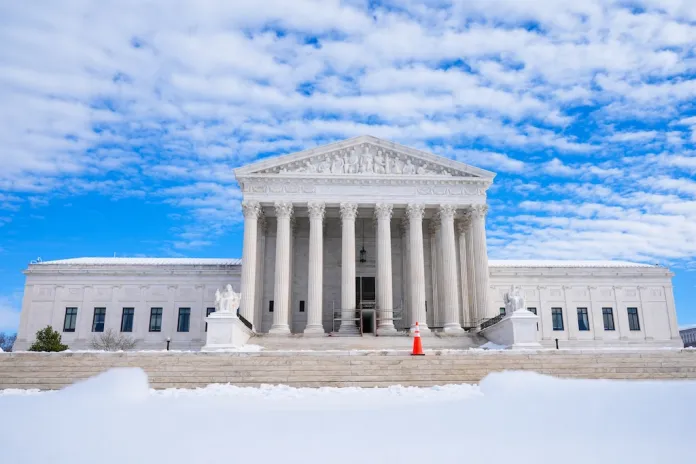Supreme Court narrows federal environmental reviews for major energy projects
On a recent ruling, the Supreme Court has imposed new limits on the National Environmental Policy Act (NEPA), which has long required federal agencies to assess the environmental impacts of important energy and infrastructure projects. In an unanimous decision (8-0), the Court determined that environmental reviews should focus solely on the direct environmental effects of these projects, rather than considering broader consequences, such as potential increases in pollution. This ruling is seen as a significant victory for the Trump administration and Republicans, who have criticized NEPA for causing delays and increased costs in the approval processes for large-scale projects. The case in question involved an 88-mile rail line in Utah intended to transport crude oil, where the Court ruled that federal agencies, like the Surface transportation Board, are not obligated to evaluate upstream or downstream effects related to oil production. Justice Brett Kavanaugh emphasized that the intent of NEPA is to guide agency decision-making, not hinder it. in contrast, supporters of NEPA argue that it is crucial for protecting public lands and addressing climate change.
Supreme Court narrows federal environmental reviews for major energy projects
The Supreme Court placed new limits on the bedrock environmental law that has, for decades, required federal agencies to study the environmental effects of energy and infrastructure projects such as pipelines, transmission lines, and highways.
In an 8-0 ruling, the high court determined that courts should narrow the scope of reviews required by the National Environmental Policy Act to just the environmental effects of projects, and not consider broader downstream effects. The ruling could give a boost to the Trump administration’s efforts to ease major infrastructure projects.
The decision overturned a lower appeals court ruling that sided with environmentalists who accused federal regulators of failing to assess the risks to the broader environment by building an 88-mile rail line in Utah designed to transport crude oil to refineries along the Gulf Coast.
The U.S. Court of Appeals for the District of Columbia Circuit previously ruled that the Surface Transportation Board was required to evaluate these broader effects, as the projects could contribute to greater Gulf Coast air pollution and other environmental concerns.
Thursday’s Supreme Court ruling rolled back that decision.
“Simply stated, NEPA is a procedural cross-check, not a substantive roadblock,” Justice Brett Kavanaugh said in the opinion.
“The goal of the law is to inform agency decision-making, not to paralyze it,” he said.
Kavanaugh emphasized that under the 55-year-old law, federal agencies are only required to focus on the environmental effects of projects — in this case, the rail line.
He said the law does not require the Surface Transportation Board’s environmental review, also referred to as an environmental impact statement, to address the upstream or downstream effects of oil refining.
“Rather, it needed to address only the effects of the 88-mile railroad line,” the opinion said. “And the Board’s EIS did so.”
All three liberal judges on the bench agreed with the final ruling, but offered a different reason.
In a separate concurring opinion, Justice Sonia Sotomayor insisted that NEPA reviews conducted by federal agencies should be limited to the scope of their own sector. Therefore, in the case of the Surface Transportation Board, which has expertise in transportation, it would not be required to consider the effects of oil drilling and refining.
“Under NEPA, agencies must consider the environmental impacts for which their decisions would be responsible,” Sotomayor said.
“Here, the Board correctly determined it would not be responsible for the consequences of oil production upstream or downstream from the Railway because it could not lawfully consider those consequences as part of the approval process,” she said.
Justice Neil Gorsuch did not participate in the ruling as he recused himself from the case.
The ruling was a major win for the Trump administration and Republicans, who have blamed NEPA for causing undue delays, excessive litigation, and additional costs within the permitting process for large-scale energy projects.
Supporters of the law, enacted in 1970, have insisted that NEPA is critical to avoiding the endangerment of public lands and wildlife, as well as to efforts to combat climate change.
TRUMP ORDER REQUIRES FASTER ENVIRONMENTAL PERMITTING PROCESS, ENDING PAPER APPLICATIONS
The law has remained at the forefront of the permitting reform debate in Washington, with both Republican members of Congress and President Donald Trump taking steps to simplify NEPA-required reviews.
Most recently, Trump signed an executive memorandum aimed at quickening the permitting process by bolstering the technology used in issuing these environmental reviews. This includes eliminating the use of paper-based application and review processes, accelerating processing time, reducing the length of documents related to applications, increasing the accessibility of such documents, and improving transparency of permitting schedules.
" Conservative News Daily does not always share or support the views and opinions expressed here; they are just those of the writer."




